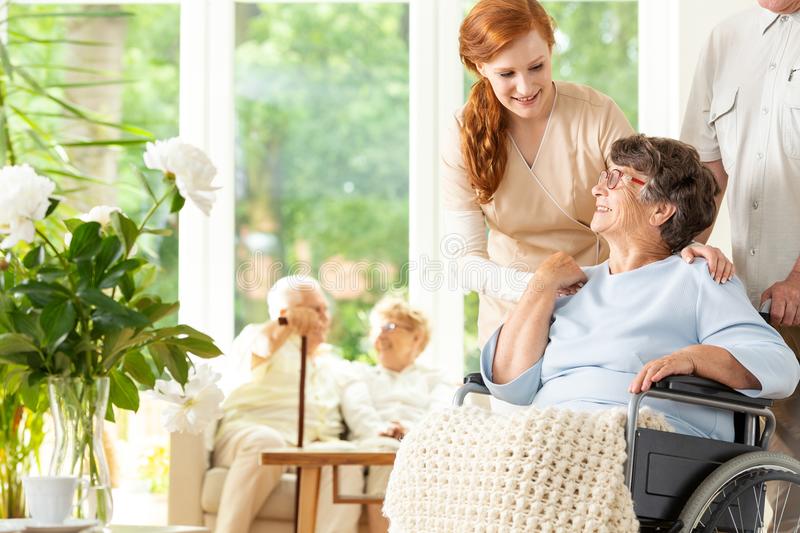Elder care, often referred to as senior care, is specialized care that is designed to meet the needs and requirements of senior citizens at various stages. As such, elder care is a rather broad term, as it encompasses everything from assisted living and nursing care to adult day care, home care, and even hospice care.
Although aging in itself is not a reason to consider elder care, it is usually the various diseases and physical limitations that accompany old age that prompt a discussion about elder care.
When is Elder Care Necessary?
Elder care is not always an absolute; in fact, some senior citizens never require any type of care to live independently in their later years. However, elder care often becomes an issue when a loved one begins experiencing difficulty with activities of daily living (ADLs), both safely and independently. ADLs may include cooking, cleaning, shopping, dressing, bathing, driving, taking meds, etc.
A general decline in health is often the impetus for the introduction of elder care, as it may indicate a waning ability to independently handle activities of daily living. For example, senility, which usually comes on at a gradual pace, may mean that a person who once remembered to take medication on time is now having difficulty doing so. Failing eyesight may mean your loved one is gradually losing the ability to move safely about the house, or advanced arthritis may mean he or she is having difficulty getting in and out of the bathtub without assistance.
The need for elder care may also happen quickly, as is the case if your loved one is recovering from a broken hip or recently had a stroke and is still suffering the cognitive and/or physical effects.
What is constant, however, is that elder care may be needed when a health condition –whether physical, cognitive, or even emotional – hinders the ability to safely complete activities of daily living.
Family members or a doctor are usually the first to recognize a need for elder care. The type of elder care that is right for your loved one, however, is largely dependent upon the type of health conditions he or she suffers from, the severity of the conditions, and the deficiencies experienced as a result.
It is up to both your loved one’s medical team and the family members closest to them to keep a close eye on any changes that may affect the ability to safely complete ADLs without assistance. There are a number of warning signs your loved one may display or exhibit that may prompt you to seek outside help:
Warning Signs to Watch Out For
- Physical problems
- Gait, stability (walking problems)
- Sensory issues (a loss or decline in hearing, seeing, smelling)
- Chronic health conditions (diabetes, heart disease, arthritis)
- Temporary or permanent physical limitations that may inhibit the senior’s ability to perform ADLs
- Cognitive problems
- Confusion
- Memory loss
- Attention problems
- Forgetting to take meds on time, at the right time, or at all
- Language problems
- Dementia
- Emotional problems
- Depression
- Social withdrawal
- Loneliness
- Changes in personality (irritable, angry, moody, etc.)
- Loss of interest in activities
Physical Problems – Chronic health problems often come about as people age and are unable to perform many of the activities they once could. Their bodies may become more fragile, more rigid, and less resilient. Chronic illnesses may cause secondary impairments, or new illnesses to develop.
Disease-related physical impairments may be easy to spot or may be subtler. For example, senior citizens with glaucoma may not appear to be physically impaired, but their loss of vision may result in accidents and falls that may greatly impact their health or well-being.
Just because your loved one hasn’t reported a physical impairment doesn’t mean he or she doesn’t require care; therefore, a complete physical examination (including vision and hearing) on a regular basis is an important part of an overall health plan.
Cognitive Problems – Although cognitive problems, at least in their mildest form, can be expected as your loved one ages, some cognitive problems may impair a his or her ability to live safely and independently. Cognitive problems may cause memory problems, difficulty with language, difficulty making judgments, and difficulty regulating emotions, just to name a few. Mild dementia may not require elder care, but any type of dementia that is progressive and causes serious safety concerns must be addressed.
Emotional Problems – A decline in health, the loss of a spouse, the inability to do things once enjoyed, or the feelings of unimportance are all issues that may cause your loved one to experience emotional problems.
Emotional problems may manifest themselves in a number of ways. For example, your loved one may become socially withdrawn, moody or irritable, or may even have suicidal thoughts.
Many seniors deny the existence or severity of emotional problems, which makes the thoughtful observations of physicians and family members all the more important.
When to Begin the Discussion about Elder Care
Elder care should become a discussion as soon as changes are noticed, as postponing or delaying assistance could jeopardize your loved one’s well-being and safety.
Family members, along with your elderly loved one, should ask the following questions to get started:
- What type of care is needed to ensure immediate/long-term safety?
- What types of care are available?
- What types of services can be used to provide care?
- Can modifications/changes be made to the home or routine to remedy the situation, or is professional help required?
- Can care be provided in the home, or is the move to a facility a better option?
- What are the financial constraints of providing elder care?

